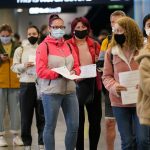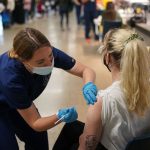Cases of meningitis B are beginning to exceed levels seen before the COVID pandemic – with university students being warned to “be aware of the early signs and symptoms”.
The increase in cases among teenagers and young adults in England in the autumn followed a fall in infectious diseases due to lockdown measures introduced to tackle the spread of coronavirus.
Meningococcal disease is a life-threatening infection caused by bacteria that can go on to cause meningitis and sepsis.
There are five main meningococcal strains that cause disease in the UK, with meningitis B the most common.
Majority of cases in students
The disease can be fatal, but can also lead to permanent disability and other serious health outcomes.
A report by the UK Health Security Agency (UKHSA), which also analysed recent data, showed that in “autumn 2021 there was an increase in the number of cases” in teenagers and young adults, mainly caused by “group B meningococcal disease”.
COVID-19: The government’s Omicron strategy was a gamble that paid off – will lifting Plan B rules be the same?
COVID-19: Infections falling in three of the four UK nations, says ONS
Christian Wakeford: Tory MP defects to Labour telling Boris Johnson he is ‘incapable of offering leadership’
It added the “majority” of cases was “among university students” with the number of cases “in 15 to 19 year olds now higher than they were pre-pandemic”.
While cases remained low throughout summer, there was an increase when many students returned to in-person teaching in schools, colleges and universities.
Between September and November 2021, 41.5% of meningitis cases were in those aged 15 to 19 – a figure that compares with 11.8% during the same period in 2018 and 14.3% in 2019.
The UKHSA report added that a total of 26 invasive meningococcal disease cases were identified among those aged 15 to 24, with 84.6% in students in further or higher education.
In the UK, teenagers are eligible for the meningococcal ACWY vaccine as part of the national immunisation programme, and the meningitis B vaccine is offered to infants.
‘Be aware of the early symptoms’
Professor Ray Borrow, one of the paper’s lead authors and head of the vaccine evaluation unit at UKHSA, said: “Students and parents need to be aware of the early signs and symptoms of meningitis and septicaemia.
“If you’re concerned you have any of the symptoms seek immediate medical help as the earlier you get treatment the better.
“Students and young people can also help protect themselves against some types of meningococcal bacteria by ensuring that they’ve had their MenACWY vaccine.
“They can do this by checking with their GP and getting the vaccine as soon as possible if they’ve yet to be vaccinated.”
Commons signs and symptoms of meningitis and septicaemia include fever with cold hands and feet, drowsy or difficult to wake, confusion and irritability, severe muscle pain, pale blotchy skin, spots or rash, severe headache, stiff neck, dislike of bright lights, and convulsions or seizures.






















